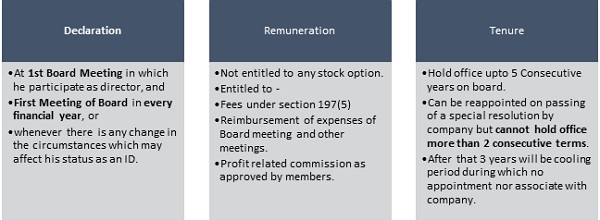Companies Act, 2013 being stringent about corporate governance, transparency, and safeguarding public interest in Companies revamp in its approach. One of the big change was the appointment of Independent directors which are mandatory to be on board of directors. A Non- Executive Director has no personal relationship with a company and is appointed to govern the workings.
It’s applicable to:
√ Every listed company to have at least one-third of a total number of directors as independent directors.
√ Other class of companies having paid-up share capital of Rs. 10 Crores or more, or turnover of Rs. 100 Crores or more, an aggregate of outstanding loans, debentures, and deposits exceeding Rs. 50 Crores or more have at least 2 as Independent directors in board.

Who can become Independent director (ID):
As the name suggests, he should be independent in relation to a company having integrity and possessing relevant expertise and experience. Having neither pecuniary relationship nor related to promotor or director of the company. Act also covered its relatives to make him independent in its overall approach to make an integral part of the decision and unbiased judgement. He is a director other than Managing director or whole-time director or a nominee director.

Additional Points:

Manner of Selection of Independent director
√ Every individual who intends to get appointed shall apply online to the institute (‘Indian Institute of Corporate Affairs’) to include his name in the databank for 1 year or 5 years or a lifetime. After so included, shall submit a declaration of compliance to board.
√ Whose name is included has to pass online proficiency self-assessment test conducted by institute within 2 years from the date of inclusion of his name, failing will result in removal from the databank of the institute. Moreover, a score of at least 50% is deemed to have passed percentage of the test.
Provided an individual not required to pass an online proficiency test if he served for total period of not less than 3 years as on date of inclusion:
A. Director or KMP in
– Listed company
– Unlisted Company having Paid-up share capital of Rs. 10 Crores.
– body corporate listed on any recognized stock exchange or in a country which is a Member State of the Financial Action Task Force on Money Laundering and the regulator of the securities market in such member State is a member of the International Organization of Securities Commissions; or
– bodies corporate incorporated outside India having a paid-up share capital of US$ 2 million or more; or
– statutory corporations set up under an Act of Parliament or any State Legislature carrying on commercial activities; or
B. in the pay scale of Director or equivalent or above in any Ministry or Department, of the Central Government or any State Government, and having experience in handling –
– the matters relating to commerce, corporate affairs, finance, industry or public enterprises; or
– the affairs related to Government companies or statutory corporations set up under an Act of Parliament or any State Act and carrying on commercial activities.
C. in the pay scale of Chief General Manager or above in the SEBI or the RBI or the IRDA or the Pension Fund Regulatory and Development Authority and having experience in handling the matters relating to corporate laws or securities laws or economic laws:
Provided also that the individuals, who are or have been, for at least 10 years’ part of the profession of – an advocate of a court; or in practice as a chartered accountant; or in practice as a cost accountant; or in practice as a company secretary, shall not be required to pass the online proficiency self-assessment test.
It’s a welcome step of MCA to include professionals and consider experienced on board to decrease the procedural part for them.




Good Article. Would request you to read two unique books of the author Ram K Narayan on 1. Management of Risks under Companies Act 2013 and 2. Corporate Governance in India- Challenges.
Available with Notion Press, Amazon, Flipkart.
Thankyou so much Sir for your feedback. Sure Sir, i will read